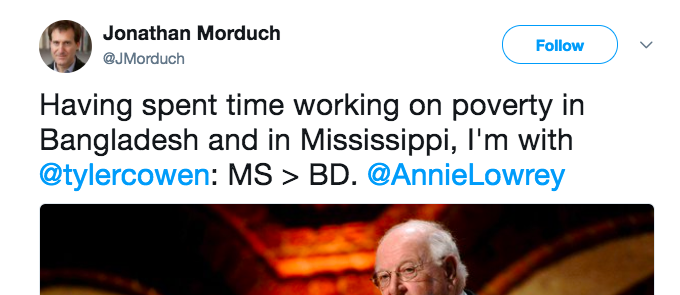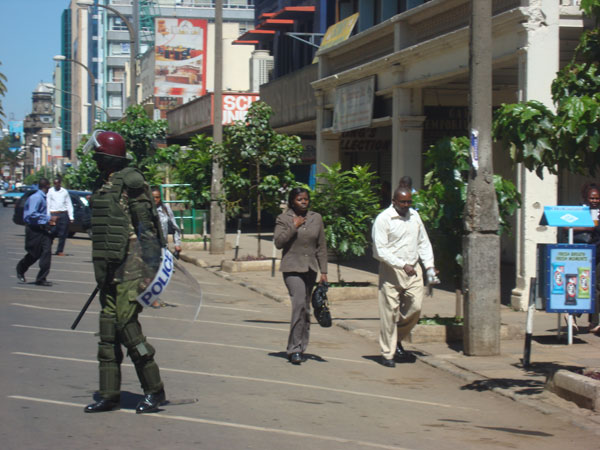Summary:
One of the things Chris is up to these days is being the academic lead for the new Peace and Recovery Initiative at IPA, which is looking to fund research about fragile states, repression, reducing crime and violence, and recovery from humanitarian disasters. Deadline for proposals is March 2 (that’s one short month), and please share with colleagues. But even for general interest reading, I recommend this “guiding principles” document, which is also a very readable summary of what Chris and our colleagues think is and isn’t yet known for the field. In undercovered “are you joking?” policies, the CDC is cutting back on emerging outbreak funding by 80%. As previously allocated funding runs out, the list of countries with epidemic prevention activities will be cut from 39 to 10. Recall
Topics:
Jeff Mosenkis (IPA) considers the following as important: African Union, conflict, Crime, development, Economics, links, miscellany, Mississippi, news, political science, poor, Poverty, Research, STATA, statistics
This could be interesting, too:
One of the things Chris is up to these days is being the academic lead for the new Peace and Recovery Initiative at IPA, which is looking to fund research about fragile states, repression, reducing crime and violence, and recovery from humanitarian disasters. Deadline for proposals is March 2 (that’s one short month), and please share with colleagues. But even for general interest reading, I recommend this “guiding principles” document, which is also a very readable summary of what Chris and our colleagues think is and isn’t yet known for the field. In undercovered “are you joking?” policies, the CDC is cutting back on emerging outbreak funding by 80%. As previously allocated funding runs out, the list of countries with epidemic prevention activities will be cut from 39 to 10. Recall
Topics:
Jeff Mosenkis (IPA) considers the following as important: African Union, conflict, Crime, development, Economics, links, miscellany, Mississippi, news, political science, poor, Poverty, Research, STATA, statistics
This could be interesting, too:
Lars Pålsson Syll writes Schuldenbremse bye bye
Lars Pålsson Syll writes What’s wrong with economics — a primer
Lars Pålsson Syll writes Krigskeynesianismens återkomst
Lars Pålsson Syll writes Finding Eigenvalues and Eigenvectors (student stuff)
- One of the things Chris is up to these days is being the academic lead for the new Peace and Recovery Initiative at IPA, which is looking to fund research about fragile states, repression, reducing crime and violence, and recovery from humanitarian disasters. Deadline for proposals is March 2 (that’s one short month), and please share with colleagues. But even for general interest reading, I recommend this “guiding principles” document, which is also a very readable summary of what Chris and our colleagues think is and isn’t yet known for the field.
- In undercovered “are you joking?” policies, the CDC is cutting back on emerging outbreak funding by 80%. As previously allocated funding runs out, the list of countries with epidemic prevention activities will be cut from 39 to 10.
- Recall that in 2015, the Gates Foundation ran a simulation of how a 1918 Spanish Flu-type epidemic would spread today in light of modern travel patterns. They found it would be in every major global city within 60 days, and by 250 days would kill more than 33 million people. Or, as Ezra Klein called it in his interview with Bill Gates, “The most predictable disaster in the history of the human race.” Ebola and Bird Flu showed how unprepared we were at the time, and continue to be.
- In addition to Kenny and Sandefur’s response to Deaton’s NYTimes piece arguing that extreme poverty is as bad in the U.S. as in the developing world, Ryan Briggs explains the confusion. Like everything else in poverty policy it comes down to whether you’re measuring income or consumption. Income is very difficult to measure accurately in people with low and irregular earnings, and doesn’t include the many other ways the poor have to scrape to get by.

- That said, comparative suffering is a rough game to play though, and as the Brookings folks point out we don’t have to sacrifice domestic anti-poverty spending for global. Here’s a short but pretty moving portrait from the Wall Street Journal on one way people in poor Mississippi scrape by, using high-interest lenders for short-term loans. They of course can end up deeper in debt or losing the car they need to get to work. But if you listen to what people say they weren’t being irresponsible – they knew what they were getting into, but the choice was better than the alternative (such as being evicted, having the heat turned off, or not being able to feed their children).
- One contribution I’ve mentioned before to bad domestic poverty policy are stereotypes about the poor as being undeserving, lazy, or preferring government benefits to working. This would be a good time to recall the U.S. had not just one, but multiple TV shows about people’s cars being repossessed because they couldn’t keep up with loans.
- So with the announcement this week that Grameen USA will be raising money for impact investing funds, it might be worth thinking about why there’s been so much attention to socially-minded microcredit abroad, but not domestically.
- Handy tools:
- China built the African Union a brand new headquarters building full of shiny technology and then spied on them for five years. China says it has no idea why the African Union servers were connecting to Beijing at midnight.
(Source for image above)

